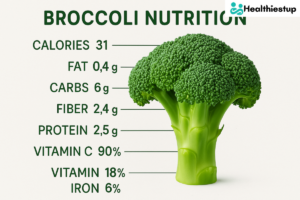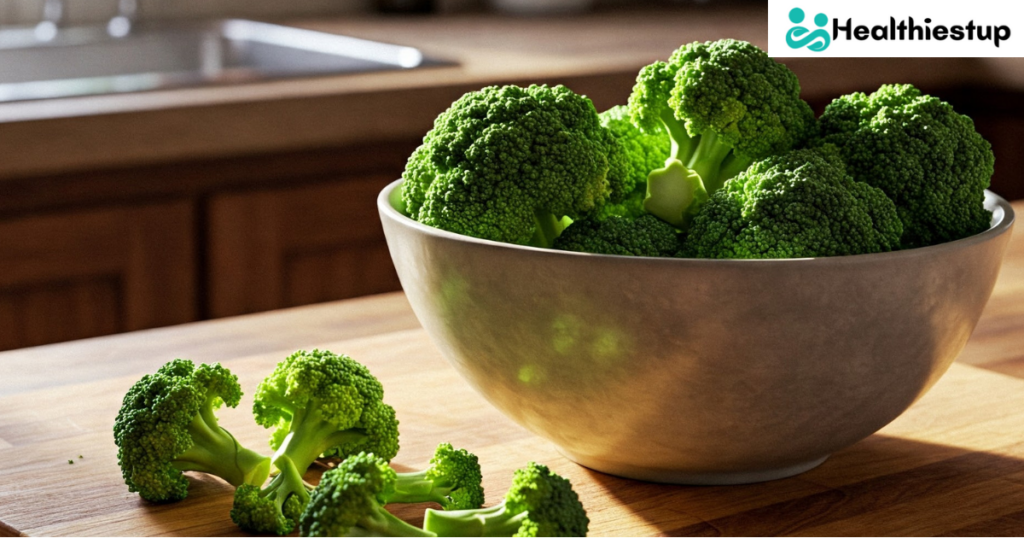Introduction
Broccoli dietary tips: Broccoli isn’t just that green veggie your mom made you eat as a kid it’s a powerhouse of nutrition, a true superfood that deserves a starring role on your plate. Whether you’re trying to lose weight, improve digestion, or simply eat healthier, broccoli can be your best friend in the kitchen. Packed with fiber, vitamins, minerals, and potent plant compounds, this cruciferous vegetable is one of the healthiest additions to any diet. Ready to dive into the world of broccoli dietary tips, nutrition facts, and health perks? Let’s get into it.
Why Broccoli Should Be a Regular Part of Your Diet
Broccoli dietary tips: Broccoli is one of those vegetables that serves every need. It’s low in calories, high in nutrients, and versatile enough to be included in everything from salads to stir-fries. Just one cup of raw broccoli provides over 100% of your daily vitamin C requirement — that’s more than an orange!
Eating broccoli regularly can:
-
Support immune health
-
Aid in digestion
-
Help control blood sugar levels
-
Boost heart health
-
Provide anti-inflammatory benefits
With such an impressive list, it’s easy to see why broccoli should be a dietary staple.
Nutritional Profile of Broccoli

Let’s break down exactly what you’re getting when you eat broccoli. The nutritional content of a cup (91 grams) of raw broccoli is as follows:
- Calories: 31
-
Protein: 2.5 grams
-
Carbohydrates: 6 grams
-
Fiber: 2.4 grams
-
Vitamin C: 135% of the Daily Value (DV)
-
Vitamin K: 116% of the DV
-
Folate: 14% of the DV
-
Potassium: 8% of the DV
-
Iron: 4% of the DV
Beyond vitamins and minerals, broccoli is rich in antioxidants, plant compounds like sulforaphane, which has powerful anti-cancer properties. That’s a serious nutrient package for a humble vegetable.
Top Broccoli Dietary Tips for Eating More it
Broccoli dietary tips: Broccoli dietary tips: Let’s be honest — not everyone loves broccoli at first bite. fortunately it all depends on how you prepare it. These broccoli dietary tips will help you add more of it to your meals without getting bored:
1. Steam It Right
Broccoli dietary tips: Steaming is one of the best ways to retain the nutrients in broccoli. Overcooking can destroy valuable vitamins, so aim for a bright green color with a bit of crunch. Try seasoning with garlic, lemon juice, or a drizzle of olive oil for extra flavor.
2. Add to Smoothies
Broccoli dietary tips: Yes, you read that right. Raw or lightly steamed broccoli can be tossed into a green smoothie. When blended with fruits like banana and pineapple, you won’t even taste it — but your body will thank you for the fiber and nutrients.
3. Roast for Rich Flavor
Broccoli dietary tips: Roasted broccoli with a bit of olive oil, salt, and pepper can taste amazing. The edges get crispy, the flavor gets nutty, and it’s an easy side dish for almost any meal.
4. Make It the Star of Stir-Fries
Broccoli dietary tips: Broccoli soaks up flavors beautifully in stir-fries. Pair it with lean protein like chicken or tofu, add soy sauce, garlic, and ginger, and you’ve got a quick and healthy dinner.
5. Use in Salads
Broccoli dietary tips: Broccoli doesn’t always need to be cooked. Finely chopped raw broccoli can be added to salads for a crunchy texture. Try a broccoli slaw with a yogurt-based dressing for a refreshing lunch option.
Broccoli for Weight Loss: A Secret Weapon
Broccoli dietary tips: If you’re watching your weight, broccoli should definitely be on your radar. It’s low in calories but high in fiber, which means it keeps you full longer. Fiber also slows down digestion, curbing those hunger pangs and preventing overeating.
That’s why it’s innovative for weight loss:
-
High water content helps you feel full
-
Low glycemic index keeps blood sugar stable
-
Rich in fiber supports digestion and reduces cravings
Swapping out starchy sides like potatoes or rice for steamed or roasted broccoli can reduce your calorie intake without sacrificing volume or satisfaction.
Broccoli and Digestive Health: A Gut-Friendly Food
Broccoli dietary tips: Your gut loves broccoli and for good reason. Broccoli is rich in dietary fiber, a key player in maintaining a healthy digestive system. A single serving offers nearly 10% of your daily fiber needs. This not only keeps things moving, but it also helps your gut’s healthy bacteria grow.
When your gut microbiome is balanced, everything else improves from immune response to mental health. Broccoli contains compounds like glucoraphanin that interact positively with your gut flora, promoting a healthy gut environment.
Here’s how broccoli supports digestion:
-
Prebiotic fiber feeds beneficial bacteria
-
Promotes regular bowel movements
-
Reduces inflammation in the digestive tract
-
Helps prevent constipation and bloating
For people with IBS or sensitive stomachs, lightly steaming broccoli instead of eating it raw can reduce the risk of gas or discomfort. And pairing it with a probiotic source, like yogurt or kimchi, can further enhance digestive benefits.
Broccoli’s Role in Preventing Chronic Diseases
Broccoli dietary tips: Broccoli isn’t just good for your short-term health it’s a powerful ally in the fight against chronic disease. Its rich antioxidant profile can protect your cells from oxidative stress, a major cause of aging and illness.
The real superstar here is sulforaphane, a sulfur-rich compound found in cruciferous vegetables like broccoli. It has been widely studied for its ability to:
-
Neutralize toxins in the body
-
Support liver function
-
Protect against cancer by halting tumor growth
-
Reduce the risk of heart disease
-
Support brain health and reduce neurodegeneration
Eating broccoli just a few times a week has been linked to lower risks of certain types of cancers, particularly breast, prostate, and colon cancer. That’s powerful stuff for a simple green veggie.
How Broccoli Supports Heart Health
Broccoli dietary tips: When it comes to keeping your ticker in top shape, broccoli has some serious heart-health credentials. It’s full of antioxidants, potassium, fiber, and anti-inflammatory compounds that all work together to reduce the risk of cardiovascular disease.
Here’s how broccoli boosts heart health:
-
Lowers cholesterol: Compounds in broccoli bind to bile acids in your gut, helping remove excess cholesterol from the body.
-
Lowers blood pressure: Broccoli’s potassium and magnesium concentration can help reduce blood pressure levels within normal ranges.
-
Reduces inflammation: Broccoli’s anti-inflammatory qualities can help reduce chronic inflammation, which is a major cause of heart disease.
-
Strengthens blood vessels: Sulforaphane also helps reduce oxidative stress in blood vessels, keeping them flexible and strong.
Including broccoli in your meals a few times a week can make a measurable difference in your heart’s long-term health.
| Also Read: Eat Smart: 15 Healthy Low Calorie Snacks to Stay Full & Fit
Tips for Buying and Storing Broccoli
Broccoli dietary tips: To get the most out of your broccoli, it’s important to choose it wisely and store it correctly. Taste, texture, and nutrient content are each related to freshness.
Here’s what to look for when buying broccoli:
-
Color: Choose broccoli that’s deep green with firm stalks and tightly packed florets.
-
Avoid yellowing: Yellow florets indicate age and nutrient loss.
-
Smell: A fresh broccoli head should smell mildly earthy — not bitter or sour.
When it comes to storage, follow these tips:
-
Refrigerate: Store in the fridge in a plastic bag with small holes for airflow.
-
Do not wash before storing: since moisture might encourage the growth of mold.
-
Use within 3 to 5 days for best nutrition and flavor.
-
Freeze if needed: Blanch broccoli in boiling water for 2-3 minutes, then freeze to retain nutrients.
Smart storage means less waste and more of the good stuff going into your body.
Creative Ways to Cook Broccoli
Broccoli dietary tips: Let’s face it steamed broccoli can get boring fast. If you want to make this superfood a regular guest at your table, you’ve got to keep things interesting. Thankfully, there are endless creative ways to cook broccoli that go far beyond the basics.
Broccoli Pesto
Skip the basil and try a unique pesto made from blanched broccoli, garlic, parmesan, and olive oil. It’s amazing on pasta, toast, or even pizza.
Broccoli Fritters
Combine chopped broccoli with egg, breadcrumbs, and your favorite seasoning, then fry until golden. It’s like a veggie nugget that both kids and adults love.
Broccoli Tacos
Roast broccoli florets with chili powder and cumin, then stuff them into warm tortillas with avocado and lime crema. Trust me, it’s a game changer.
Broccoli Soup
Blend cooked broccoli with sautéed onions, garlic, and broth for a creamy, comforting soup. Add a splash of cream or coconut milk for extra richness.
Switching up your broccoli game keeps meals exciting and ensures you get all the amazing health perks without getting bored.
Broccoli and Bone Health: A Natural Calcium Booster
Broccoli dietary tips: Strong bones aren’t just about drinking milk — they need a combination of nutrients like calcium, vitamin K, magnesium, and phosphorus. Broccoli offers a unique bone-supporting mix, especially for those who avoid dairy.
One cup of cooked broccoli provides a decent dose of calcium, but more importantly, it contains vitamin K, a lesser-known but essential nutrient that helps your body absorb and use calcium effectively. Without enough vitamin K, calcium can’t bind properly to your bones.
Here’s why broccoli is great for your bones:
-
High in vitamin K1: Supports bone mineralization and density
-
Contains calcium and magnesium: Helps build strong bones
-
Anti-inflammatory benefits: Lowers the chance of inflammation-induced bone loss
For vegetarians, vegans, or those with lactose intolerance, broccoli is a must-have to help maintain healthy bones naturally. Add it to salads, stir-fries, or make it a side dish to boost your daily intake of bone-building nutrients.
The Immune-Boosting Powers of Broccoli

If you want to fend off colds, flu, and infections, broccoli has your back. This green veggie is packed with immunity-supporting nutrients like vitamin C, beta-carotene, zinc, and various flavonoids that help strengthen your immune response.
Vitamin C is a big player in immunity, and broccoli is surprisingly rich in it — more than many fruits! This vitamin stimulates the production of white blood cells, your body’s front-line defenders against illness.
Here’s how broccoli supports your immune system:
-
Vitamin C improves immune cell performance
-
Beta-carotene is converted to vitamin A, which is essential for healthy mucous membranes and skin.
-
Antioxidants fight free radicals that weaken the immune system
-
Glutathione in broccoli acts as a powerful detoxifier
Eating broccoli regularly can help your body stay ready to fight off infections and recover faster when illness strikes. Try it raw in salads or steamed as a quick side dish to harness its immune-boosting benefits.
Broccoli and Skin Health: Glow from the Inside Out
Broccoli dietary tips: Beautiful, radiant skin starts with what you put on your plate and broccoli is a skin-loving superstar. Its high antioxidant content helps reduce signs of aging, prevent sun damage, and promote a healthy glow.
Here’s how broccoli supports skin health:
- Vitamin C improves skin suppleness by increasing the production of collagen
-
Vitamin A and beta-carotene help reduce acne and inflammation
-
Sulforaphane protects the skin from UV damage
-
Antioxidants fight oxidative stress that causes wrinkles and dullness
Plus, broccoli contains omega-3 fatty acids, which help keep your skin moisturized and supple. Whether you’re battling acne or trying to maintain youthful skin, adding more broccoli to your diet can help you glow from the inside out.
Can You Eat Broccoli Every Day?
Short answer: yes! Broccoli is safe — and actually beneficial — to eat every day for most people. In fact, the more you eat, the more consistent the health benefits.
That said, like any food, moderation is key. Eating large quantities of raw broccoli may cause gas or bloating for some, especially if your digestive system is sensitive. Cooking it lightly can reduce these effects while still preserving nutrients.
Here’s how to eat broccoli every day without going overboard:
-
Switch raw and cooked forms to make digestion easier
-
Stick to 1-2 servings a day as a general guide
-
Balance with other veggies to ensure variety in your diet
Daily broccoli intake can help lower blood pressure, improve blood sugar control, support detoxification, and more. So go ahead — make it a part of your regular routine.
Conclusion:
Broccoli dietary tips: When it comes to superfoods, broccoli doesn’t just walk the walk it crunches the crunch. From weight loss and digestion to skin care and chronic disease prevention, broccoli delivers powerful health benefits with every bite. It’s incredibly easy to incorporate into your diet, budget-friendly, and versatile enough to never get boring.
So, what are you waiting for? Whether you’re tossing it in a salad, roasting it with spices, or blending it into a smoothie, broccoli deserves a spot in your kitchen and your health journey. Start small, experiment with different cooking styles, and enjoy the transformation that this green giant can bring to your wellness routine.
FAQs
Q1. Can broccoli help with weight loss?
Yes! Broccoli is low in calories and high in fiber, which helps you feel better for longer and supports good weight management.
Q2. Is it better to eat broccoli raw or cooked?
Both have benefits. Broccoli that has been briefly cooked releases more antioxidants like sulforaphane, but raw broccoli maintains more vitamin C.
Q3. How many servings of broccoli should I consume each day?
One to two servings per day (about 1–2 cups) is a good range for most people to enjoy the health benefits without overdoing it.
Q4. Can broccoli cause gas or bloating?
Sometimes, especially when eaten raw. Steaming broccoli lightly can help reduce digestive discomfort.
Q5. What’s the healthiest way to cook broccoli?
Steaming is one of the healthiest methods as it preserves most nutrients while making it easier to digest.



